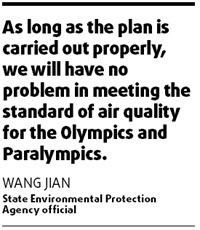The central authorities have ordered Beijing and its five surrounding provinces to cut industrial pollution for two months from late July, in the latest move to ensure clean air for the Olympics and Paralympics.
The capital and its neighboring Tianjin municipality, as well as the provinces of Hebei, Inner Mongolia, Shanxi and Shandong, will have to cut emissions under a wide-ranging plan approved by the State Council in September.
"The air quality of Beijing is definitely influenced by neighboring provinces and ... we have made this move to guarantee air quality," Wang Jian, director of the air and noise pollution control division at the State Environmental Protection Agency, said yesterday.

The plan will include using air-cleaning technology or partial closures rather than the wholesale shutdown of industries.
"We took into consideration the endurance of the economy and we don't think it will have too big an impact on it," Wang said of the latest step.
The move, which is based on studies at Tsinghua and Peking universities, starts by targeting major polluters such as power and steel plants.
"It identifies polluters down to individual power plants and factories, and specifies what they need to do and when they should start and finish their pollution-reduction projects," Wang said.
More than 10 factories in Beijing and Hebei previously scheduled for closure over the next two years will be shut down before June, Wang said.
Beijing's worst polluter, Shougang Steel, has said it would move its facilities out of the capital by 2010 and reduce operations during the Olympics - part of a raft of measures already in place in the capital.
The main anti-pollution plan also recommended Beijing restrict the use of private vehicles by banning cars with registrations ending in odd and even numbers on alternate days, but said that details of the measures will be up to the city authorities.
The scale of pollution reduction will depend on climatic conditions in the capital during the Olympic and Paralympics, Wang said, with more restrictive measures being put in place if necessary.
"In the worst weather conditions, more reductions would be required of industry, more restrictions would be applied to vehicles and construction sites," he said.
"But scientists said the likelihood of such weather conditions in August is low."
"As long as the plan is carried out properly, we will have no problem in meeting the standard of air quality for the Olympics and Paralympics," Wang said.
In a related development, Beijing will step up its pollution control efforts in various ways, such as closing heavy-polluting plants and upgrading environmental remediation facilities.
The cleanup will continue after the Olympics, according to a bulletin posted by the Beijing municipal government last Friday, as the city plans to shut a total of 40 heavily polluting, energy-intensive companies by the end of December.